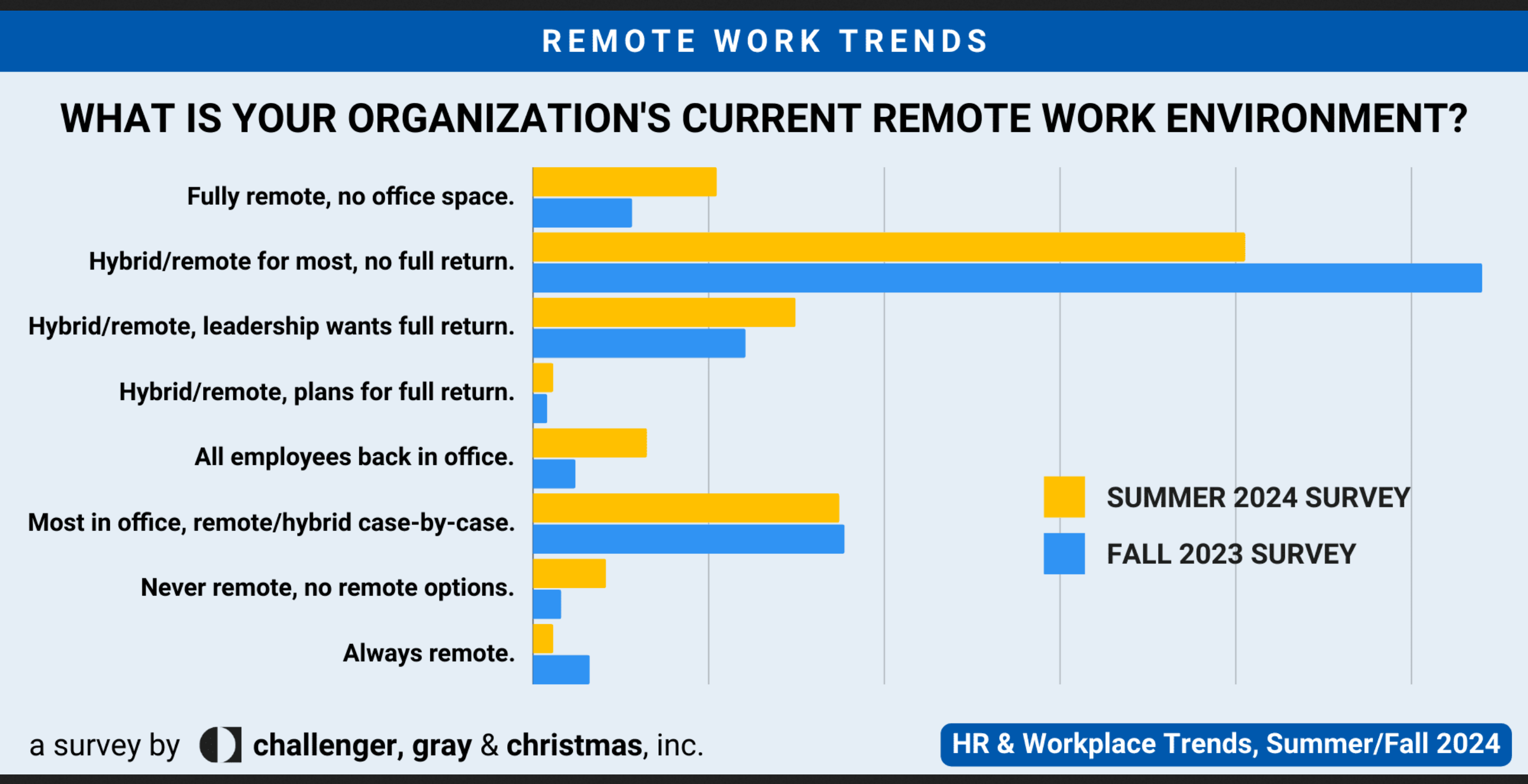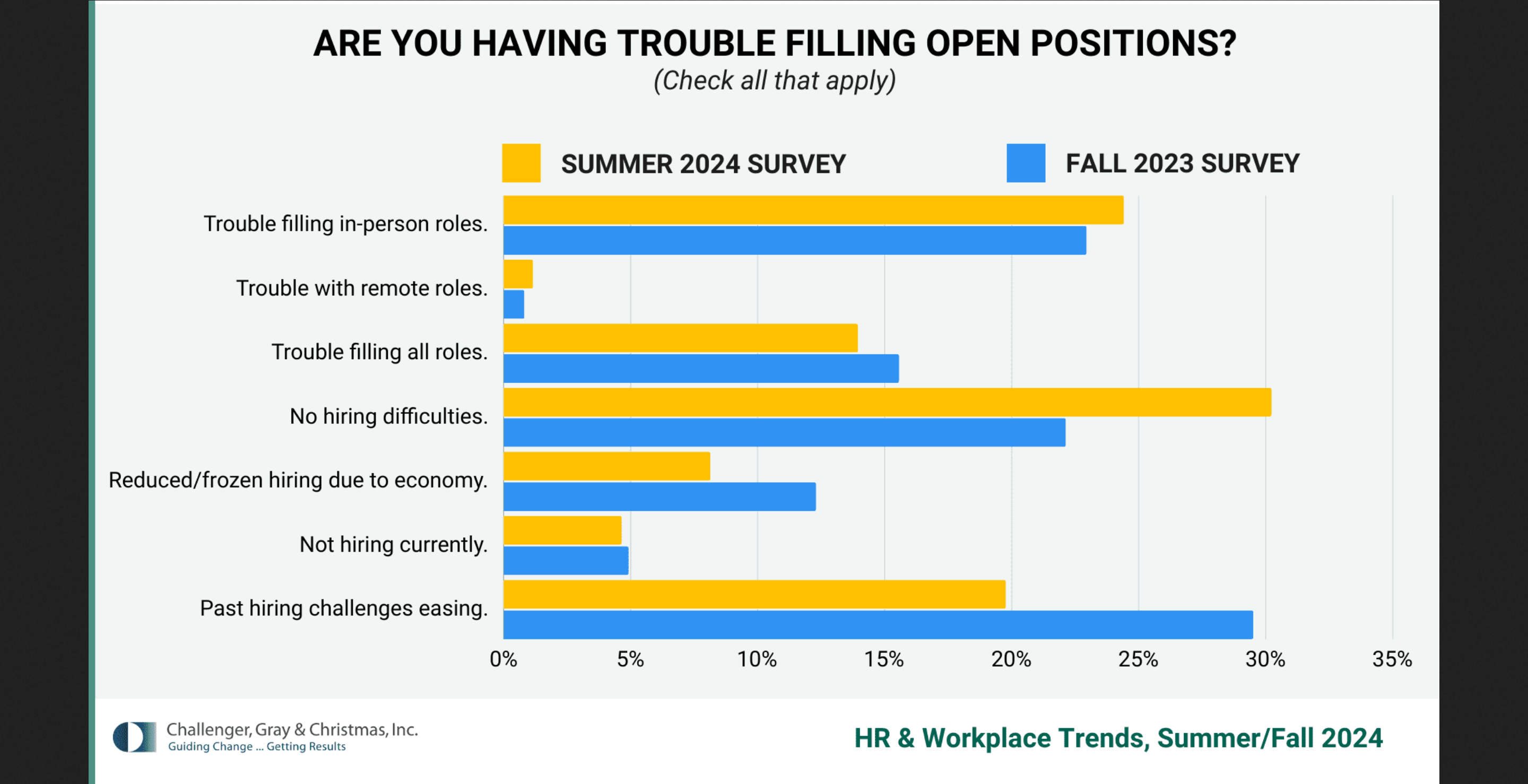Flexibility Continues to Prevail
The way we work has undergone a seismic shift since the pandemic, with remote work evolving from an emergency solution to a defining feature of the modern workplace. What started as a necessity has now become a strategy, reshaping how businesses attract talent, build teams, and operate on a global scale.
In 2025, remote work is no longer just about flexibility—it’s a business imperative. Companies are adapting their strategies to meet the demands of a workforce that values autonomy, while also navigating challenges like collaboration, productivity, and workplace culture in a virtual setting.
Talent research and recruiting firm, Edison & Black examines the trends driving this transformation, the obstacles businesses face, and what the future holds as remote work continues to redefine the boundaries of work and home life. From innovative tools to shifting employee expectations, here’s a closer look at what’s ahead in the next chapter of the remote work revolution.
Geographic Diversity in Hiring
Remote work has broken down geographic barriers, enabling companies to tap into a global talent pool no longer limited to candidates within commuting distance, businesses are finding top talent in cities, countries, and continents they’d never considered before.
As research from SHRM indicates, the move to remote work will remain a major business trend in the coming years, though it won’t be the only lasting impact of the pandemic.
This shift offers tremendous benefits:
- Expanded access to skills: Companies can hire niche experts regardless of location.
- Enhanced diversity: Teams bring fresh perspectives shaped by different cultural and regional experiences.
However, managing a geographically distributed workforce isn’t without challenges:
- Time zones: Scheduling meetings or coordinating across vastly different work hours can be a logistical headache.
- Cultural differences: Miscommunication or clashing work styles may arise without intentional efforts to foster understanding.
- Local labor laws: Hiring abroad requires navigating tax, compliance, and employment regulations specific to each region.
Prediction: Asynchronous Collaboration Takes Center Stage
In 2025, expect companies to double down on tools that support asynchronous work. Platforms enabling seamless communication, project tracking, and knowledge sharing—regardless of time zone—will become critical investments for managing distributed teams.
Health and Wellness in the Remote Era
As remote work solidifies its role in the modern workplace, employee health and wellness have taken center stage. Mental health benefits, once a secondary consideration, are now a top priority for companies aiming to support their distributed teams. Employers are recognizing that remote work, while flexible, can also blur boundaries, leading to burnout and isolation if left unchecked.
In response, digital health solutions are thriving. Virtual therapy sessions, wellness apps, and robust employee assistance programs are becoming standard offerings. These tools help workers maintain balance, whether through accessible mental health support or daily reminders to unplug and recharge.
Looking ahead, businesses are expected to invest in "remote work readiness" initiatives. These programs will focus on equipping employees with ergonomic home office setups, mindfulness training, and resources for maintaining physical and mental well-being. In 2025, the most forward-thinking companies won’t just offer remote work—they’ll empower their teams to thrive in it.

Source: Challenger, Gray & Christmas, Inc.
Technology: The Backbone of Remote Work
As remote work becomes the norm, technology continues to evolve as its driving force. From AI-driven collaboration tools to virtual reality (VR) platforms, the innovations enabling seamless virtual interaction are reshaping how businesses operate and teams connect.
Key Developments in Remote Work Technology
- AI-Driven Tools: Automated scheduling, intelligent project management, and language translation are enhancing productivity across diverse, global teams.
- Virtual Reality: VR is moving beyond gaming, creating immersive environments for team collaboration, training, and brainstorming sessions.
- Digital "Co-Working Spaces": Emerging platforms simulate the energy of an office, offering shared virtual spaces for impromptu conversations and real-time collaboration.
- Holographic Meetings: Advancements in holographic technology hint at a future where remote workers appear as 3D projections, making virtual meetings feel personal and engaging.
Challenges on the Horizon
While the future of remote work technology is exciting, it brings significant hurdles.
- Cybersecurity Risks: Decentralized teams create vulnerabilities, requiring robust measures to protect sensitive data.
- Data Privacy: Striking a balance between monitoring productivity and respecting employee privacy remains a pressing concern.
Businesses embracing remote work in 2025 will need to invest not only in cutting-edge technology but also in strategies to address these challenges. The companies that succeed will be those that innovate while maintaining trust and security across their remote ecosystems.
Redefining Corporate Culture
As remote work cements its place in the modern workplace, companies are rethinking how to preserve and nurture their corporate culture. Flexibility is a hallmark of remote work, but it often comes at the cost of team cohesion and a shared sense of identity. To bridge this gap, organizations are turning to creative strategies like virtual team-building exercises and hybrid social events that blend in-person and remote participation.
Looking ahead, the emergence of specialized roles such as Chief Remote Work Officers signals a shift in how businesses approach workplace strategies. These leaders will focus on crafting inclusive, engaging environments where remote and on-site employees feel equally connected to the company’s mission and values. Balancing the freedom of remote work with the glue of a strong corporate culture will define workplace success in the years to come.
Addressing Inequities in Remote Work
While remote work has opened doors to greater flexibility and opportunity, it has also highlighted disparities in access to essential resources. Employees in underserved areas often face challenges like unreliable internet connections or a lack of adequate technology, creating a “digital divide” that can hinder productivity and growth.
Key strategies to address these inequities include:
- Providing financial support for high-speed internet and necessary equipment like laptops and ergonomic furniture.
- Partnering with local organizations to improve infrastructure in remote and rural areas.
- Implementing resource-sharing programs where employees can access communal tools or virtual co-working spaces.
Addressing these inequities is critical for ensuring that remote work benefits are accessible to all, regardless of location or background.
Sustainability Through Remote Work
Remote work is emerging as a cornerstone of corporate sustainability efforts, with fewer commutes and downsized office spaces leading to significant reductions in carbon emissions. Employees swapping daily drives for virtual meetings are directly contributing to a cleaner environment, while companies save on energy and real estate costs.
Looking ahead, remote work policies are expected to become integral to Environmental, Social, and Governance (ESG) strategies. These policies will not only showcase environmental impact but also highlight a company’s commitment to forward-thinking business practices.
Take the example of a global corporation that embraced a hybrid model, slashing its emissions by 40%. By reducing office space and offering employees flexibility, it achieved both environmental goals and operational efficiency, underscoring the dual benefits of sustainability-driven remote work.
This shift signals a future where the way we work and the planet’s health go hand in hand.
Emerging Challenges and Opportunities
As remote work continues to redefine the workplace in 2025, its evolution brings a mix of hurdles and openings for innovation. On the challenge side, employee burnout, isolation, and the ever-present blurring of work-life boundaries remain pressing concerns. Without the physical separation of an office, many workers struggle to disconnect, leading to mental and emotional strain.
Yet, these same challenges present opportunities for forward-thinking organizations. Companies have the chance to create more flexible, inclusive, and resilient environments, tailoring policies to support diverse needs. For example, offering customizable schedules, regular wellness check-ins, and virtual networking initiatives can transform potential pain points into growth areas.
Looking ahead, government involvement is likely to grow. With remote work becoming the norm for millions, regulations around remote work rights—such as mandated "right to disconnect" laws and minimum standards for home office setups—are poised to take center stage. These changes will set new benchmarks for how companies and employees navigate the remote era.
Remote Work as a Strategic Talent Acquisition Tool
As hybrid and remote work options become more established, organizations are increasingly using flexible work arrangements as a strategic tool in their talent acquisition efforts. Remote work opens up access to a global talent pool, allowing companies to source candidates from regions previously out of reach due to geographic constraints.

However, this shift comes with its own challenges. The competition for remote workers has intensified, leading to higher compensation demands and necessitating a stronger focus on employee retention strategies. In response, HR Executive reports that human resources leaders are adapting by refining their employer brand and integrating remote work options into their long-term hiring plans. A key prediction for the future is the continued rise of remote-first recruitment strategies, where companies prioritize flexible roles to attract diverse and highly skilled candidates.
HR Executive goes on to note that by 2025, we can expect a further integration of AI tools into recruitment processes to help organizations effectively manage this remote talent influx. AI-driven tools will assist in not just recruitment but also onboarding, virtual training, and performance management to ensure that remote teams remain engaged and productive. As this shift becomes more embedded, companies that fail to innovate their remote hiring practices risk losing out on high-value talent to more adaptable competitors.
Evolving HR Technology and Data Use in Remote Work
The rapid expansion of remote work has spurred a major transformation in HR technology. As organizations adapt, HR leaders are investing more in tools that offer detailed data insights on remote employee performance, engagement, and well-being. These technologies enable companies to make more informed decisions about work policies, benefits, and even team dynamics. A major trend emerging in 2025 is the increased reliance on AI and automation to streamline these processes.
AI-powered platforms are being used to monitor key performance indicators (KPIs), measure employee satisfaction through sentiment analysis, and even predict burnout risk before it becomes a significant issue. For example, tools like Workday and SAP SuccessFactors are helping HR teams better manage dispersed workforces by offering centralized platforms for tracking employee metrics, reducing administrative burdens, and fostering a more transparent and data-driven culture.
The potential of these technologies will only grow as more companies embrace hybrid or fully remote models. Predictions indicate that by 2025, there will be greater investment in data analytics tools that help HR teams optimize remote work strategies, from performance tracking to employee development. As a result, HR leaders must not only become more data-fluent but also ensure that their teams are equipped to handle the ethical and logistical challenges of working with large amounts of employee data. This shift towards data-centric HR practices will allow organizations to maintain productivity while safeguarding employee privacy and fostering a supportive remote work culture.
The Future of Work
The landscape of work is rapidly changing, with organizations adapting to the demand for more flexibility and agility. As companies refine their approaches to hybrid and remote work, they must also focus on fostering skills-based talent strategies that prioritize competencies over traditional job titles. This shift not only helps attract and retain the right talent but also prepares organizations for the future of work, where adaptability, inclusivity, and continuous learning are key to success.
Embracing Flexibility, Remote Models, and Skills-Based Talent Strategies
With emerging challenges such as burnout and the ongoing debate over return-to-office policies, companies that prioritize flexibility, skills development, and employee well-being will be best positioned to thrive in an increasingly competitive and ever-changing business environment.
